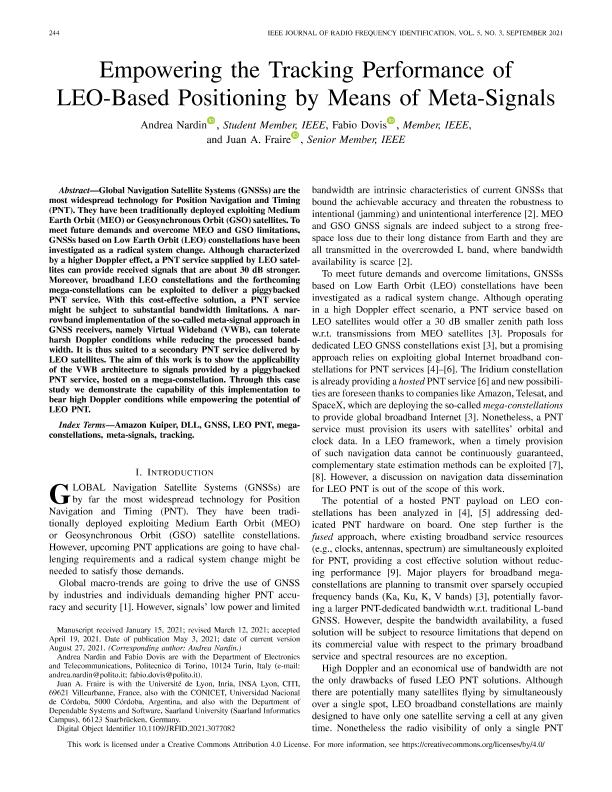Mostrar el registro sencillo del ítem
dc.contributor.author
Nardin, Andrea
dc.contributor.author
Dovis, Fabio
dc.contributor.author
Fraire, Juan Andres

dc.date.available
2022-08-03T17:49:29Z
dc.date.issued
2021-09
dc.identifier.citation
Nardin, Andrea; Dovis, Fabio; Fraire, Juan Andres; Empowering the Tracking Performance of LEO-Based Positioning by Means of Meta-Signals; Institute of Electrical and Electronics Engineers; IEEE Journal of Radio Frequency Identification; 5; 3; 9-2021; 244-253
dc.identifier.uri
http://hdl.handle.net/11336/164094
dc.description.abstract
Global Navigation Satellite Systems (GNSSs) are the most widespread technology for Position Navigation and Timing (PNT). They have been traditionally deployed exploiting Medium Earth Orbit (MEO) or Geosynchronous Orbit (GSO) satellites. To meet future demands and overcome MEO and GSO limitations, GNSSs based on Low Earth Orbit (LEO) constellations have been investigated as a radical system change. Although characterized by a higher Doppler effect, a PNT service supplied by LEO satellites can provide received signals that are about 30 dB stronger. Moreover, broadband LEO constellations and the forthcoming mega-constellations can be exploited to deliver a piggybacked PNT service. With this cost-effective solution, a PNT service might be subject to substantial bandwidth limitations. A narrowband implementation of the so-called meta-signal approach in GNSS receivers, namely Virtual Wideband (VWB), can tolerate harsh Doppler conditions while reducing the processed bandwidth. It is thus suited to a secondary PNT service delivered by LEO satellites. The aim of this work is to show the applicability of the VWB architecture to signals provided by a piggybacked PNT service, hosted on a mega-constellation. Through this case study we demonstrate the capability of this implementation to bear high Doppler conditions while empowering the potential of LEO PNT.
dc.format
application/pdf
dc.language.iso
eng
dc.publisher
Institute of Electrical and Electronics Engineers

dc.rights
info:eu-repo/semantics/openAccess
dc.rights.uri
https://creativecommons.org/licenses/by/2.5/ar/
dc.subject
GNSS
dc.subject
Meta-Signals
dc.subject
LEO-Based Positioning
dc.subject.classification
Ciencias de la Computación

dc.subject.classification
Ciencias de la Computación e Información

dc.subject.classification
CIENCIAS NATURALES Y EXACTAS

dc.title
Empowering the Tracking Performance of LEO-Based Positioning by Means of Meta-Signals
dc.type
info:eu-repo/semantics/article
dc.type
info:ar-repo/semantics/artículo
dc.type
info:eu-repo/semantics/publishedVersion
dc.date.updated
2022-08-02T17:19:05Z
dc.identifier.eissn
2469-7281
dc.journal.volume
5
dc.journal.number
3
dc.journal.pagination
244-253
dc.journal.pais
Estados Unidos

dc.journal.ciudad
Nueva York
dc.description.fil
Fil: Nardin, Andrea. Politecnico di Torino; Italia
dc.description.fil
Fil: Dovis, Fabio. Politecnico di Torino; Italia
dc.description.fil
Fil: Fraire, Juan Andres. Consejo Nacional de Investigaciones Científicas y Técnicas. Centro Científico Tecnológico Conicet - Córdoba. Instituto de Estudios Avanzados en Ingeniería y Tecnología. Universidad Nacional de Córdoba. Facultad de Ciencias Exactas Físicas y Naturales. Instituto de Estudios Avanzados en Ingeniería y Tecnología; Argentina. Universite Claude Bernard Lyon 1. Institut de Physique Nucléaire de Lyon.; Francia
dc.journal.title
IEEE Journal of Radio Frequency Identification
dc.relation.alternativeid
info:eu-repo/semantics/altIdentifier/url/https://ieeexplore.ieee.org/document/9420663
dc.relation.alternativeid
info:eu-repo/semantics/altIdentifier/doi/http://dx.doi.org/10.1109/JRFID.2021.3077082
Archivos asociados
